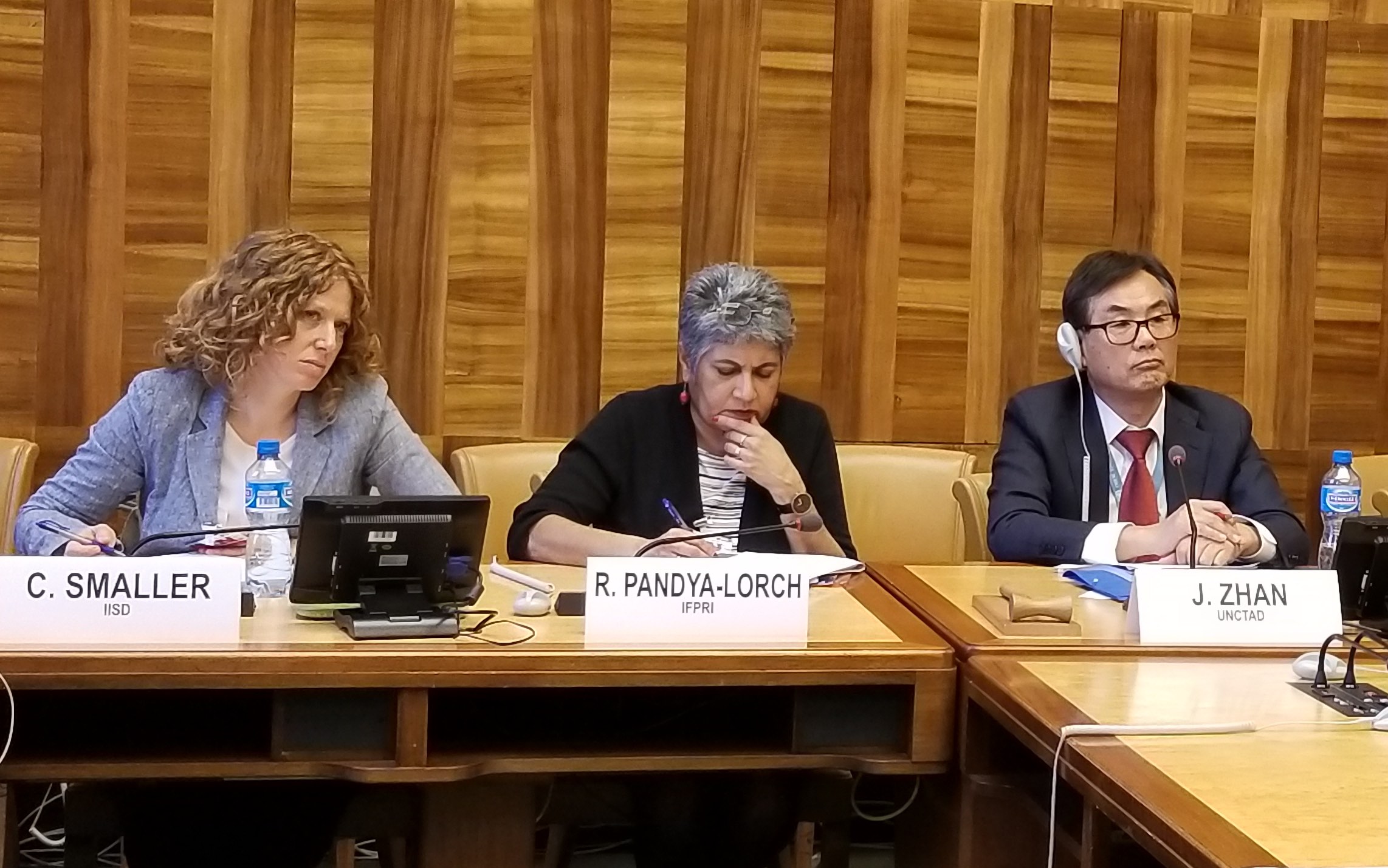Governments and development organizations should take steps to better align their investments and policies in agriculture and food systems, a panel of trade and global development experts agreed at the April 16 Geneva launch of IFPRI’s 2018 Global Food Policy Report, which focuses on the recent rise in anti-globalist sentiment around the world and the changing landscape of food security.
“In the end, it’s all about people: Are we willing to think what we could bring to the table to improve the situation at country level, then bring to global level to inspire others?” Gerda Verburg, Coordinator for the Scaling Up Nutrition (SUN) Movement, asked at the event—co-organized with the United Nations Conference on Trade and Development (UNCTAD) and moderated by James Zhan, UNCTAD senior director of Investment and Enterprise.
“Food systems are at the heart of the unprecedented reductions in poverty and hunger … they are also threatening health and environment,” said IFPRI Director of Communications and Public Affairs Rajul Pandya-Lorch, noting global problems such as environmental degradation and growing rates of overweight and obesity. Presenting an overview of the report, Pandya-Lorch noted that while 2017 can be summarized as a year of progress with strong food production and declining food prices, rising inequality and antiglobalism sentiment threaten these gains.
Alignment—of investments, policies, and other activities—was the word of the day, with several panelists emphasizing its importance to achieving progress on the themes reflected in the report.
UNCTAD Economist William Speller, a co-author of Chapter 4, noted that international agricultural investments can have positive or negative outcomes, and the factors determining success or failure happen early on. If these are not recognized and properly managed, he said, it can be detrimental to food security. Countries must work to align investments with national development strategies, he concluded, in order to maximize their impact on food security.
Fokko Wientjes, managing director of Food Solutions at the World Business Council for Sustainable Development, explained that there is cause for optimism given the business opportunity of over $2.3 trillion in the sustainable development space (calculated by the business and sustainable development commission) so it is crucial for countries to align inconsistent agriculture and food policies at the national level. In addition, the private sector should move to a better balance between investments— from farm to fork (production) and fork to farm (consumption), which is getting consumers buy-in to make healthy foods desirable.
“This comprehensive report highlights the need for inclusive business models,” said Eytan Stibbe, founder of the Vital Capital Fund. The private sector voice on the panel, Stibbe discussed a project that his company carried out in Angola that traded with farmers and invested in their economic and commercial literacy—leading to an increase of the average farmer income from $37 to $1300 monthly with 30-40 percent of the gain being net profit. This shows how business models can not only provide improvements in current income, but also lay the foundation for farmers to thrive long term, Stibbe said.
Addressing trade’s role in food systems, Carin Smaller, advisor on agriculture and investment at the International Institute for Sustainable Development (IISD), argued that current World Trade Organization (WTO) rules are imperfect and upholding the existing unfair trade system is untenable as countries have been trying for over a decade to reform it.
“We could do more!” said WTO Counsellor Ulla Kask. Discussing WTO’s role in food security, Kask said that the risk of trade wars is the organization’s most immediate concern. She framed the current obstacles to reform as opportunities in disguise. While some limited progress was made at the recent Eleventh Ministerial Conference in Buenos Aires, she said, possibilities abound to do more on issues including export restrictions, tariff reductions, reducing trade subsidy support, and encouraging investments.
Over the past 50 years, despite the existence of many development aid organizations, many poor countries have improved very little and more often through their own efforts, Verburg argued, concluding that aligning policies and investments at the country level is critical to maximize the impact of development efforts.
Katarlah Taylor is an IFPRI Senior Events Specialist.







